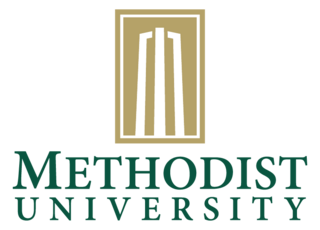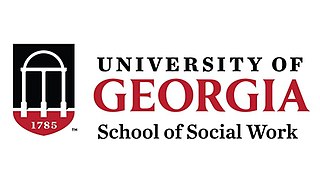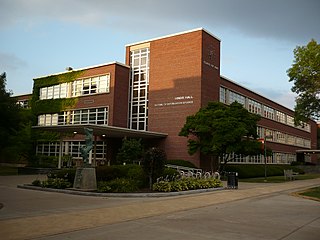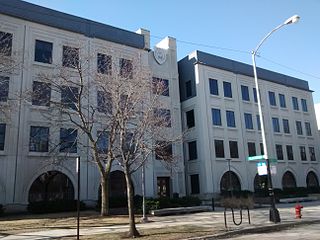Related Research Articles

Postgraduate education, graduate education, or graduate school consists of academic or professional degrees, certificates, diplomas, or other qualifications usually pursued by post-secondary students who have earned an undergraduate (bachelor's) degree.
An academic degree is a qualification awarded to a student upon successful completion of a course of study in higher education, usually at a college or university. These institutions often offer degrees at various levels, usually divided into undergraduate and postgraduate degrees. The most common undergraduate degree is the bachelor's degree, although some educational systems offer lower-level undergraduate degrees such as associate and foundation degrees. Common postgraduate degrees include engineer's degrees, master's degrees and doctorates.
A bachelor's degree or baccalaureate is an undergraduate degree awarded by colleges and universities upon completion of a course of study lasting three to six years. The two most common bachelor's degrees are the Bachelor of Arts (BA) and the Bachelor of Science. In some institutions and educational systems, certain bachelor's degrees can only be taken as graduate or postgraduate educations after a first degree has been completed, although more commonly the successful completion of a bachelor's degree is a prerequisite for further courses such as a master's or a doctorate.

Undergraduate education is education conducted after secondary education and before postgraduate education, usually in a college or university. It typically includes all postsecondary programs up to the level of a bachelor's degree. For example, in the United States, a student pursuing an associate or bachelor's degree is known as an undergraduate student while a student pursuing a master's or doctoral degree is a graduate student. Upon completion of courses and other requirements of an undergraduate program, the student would earn the corresponding degree. In some other educational systems, undergraduate education is postsecondary education up to and including the level of a master's degree; this is the case for some science courses in Britain and some medicine courses in Europe.

The Toronto School of Theology (TST) is an ecumenical consortium of seven theological colleges and is affiliated with the University of Toronto. TST is the largest ecumenical consortium for theological education in Canada. Its seven member schools are Emmanuel College, Knox College, Regis College, St. Augustine's Seminary, University of St. Michael's College Faculty of Theology, Trinity College Faculty of Divinity, and Wycliffe College.

The University of Asia and the Pacific is a private university in the Philippines. It traces its beginnings to the Center for Research and Communication (CRC), which was established on August 15, 1967, as a private think-tank that conducted economic and social research and offered graduate courses in economics.
Jewish studies is an academic discipline centered on the study of Jews and Judaism. Jewish studies is interdisciplinary and combines aspects of history, Middle Eastern studies, Asian studies, Oriental studies, religious studies, archeology, sociology, languages, political science, area studies, women's studies, and ethnic studies. Jewish studies as a distinct field is mainly present at colleges and universities in North America.
The specialist degree is an academic degree conferred by a college or university. The degree is formatted differently worldwide and may be either a five-year program or a doctoral level graduate program that occurs after a master's degree but before a doctoral degree.

Methodist University is a private university that is affiliated with the North Carolina Annual Conference of the United Methodist Church and located in Fayetteville, North Carolina. It is accredited by the Southern Association of Colleges and Schools Commission on Colleges.

The School of Information Sciences, also The iSchool at Illinois, is an undergraduate and graduate school at the University of Illinois Urbana–Champaign. Its Master of Science in Library and Information Science is currently accredited in full good standing by the American Library Association. The school is a charter member of the iSchool initiative.

The University of Georgia Graduate School coordinates the graduate programs of all schools and colleges at the University of Georgia in Athens, Georgia, United States. Established in 1910, the University of Georgia Graduate School administers and confers all professional, master's and doctoral degrees. The departments under which instruction and research take place are housed in the other schools and colleges at the university.

The University of Georgia School of Social Work (SSW) is a college within the University of Georgia (UGA) in Athens, Georgia, United States.

The Syracuse University School of Information Studies, commonly known as the iSchool, is one of the 13 schools and colleges of Syracuse University. It acts as a center for research and education in the policy, systems, service, and technology aspects of information management, information science, and library science. Established in 1896 as the School of Library Science, its name was changed in 1974 to reflect the growing information field. Syracuse University was the first library school to change its name in this way, hence its claim as "the original school for the information age." Starting in the 1970s, the school began to add new programs focused on information studies that aim to merge technology and management skills with an emphasis on human needs and behavior.
The basic requirement for pharmacists to be considered for registration is often an undergraduate or postgraduate pharmacy degree from a recognized university. In many countries, this involves a four- or five-year course to attain a bachelor of pharmacy or master of pharmacy degree.

The University of Chicago Graham School of Continuing Liberal and Professional Studies is one of eight professionals schools of the University of Chicago. The Graham School's focus is on part-time and flexible programs of study.

George Washington University Virginia Graduate Campus is the campus of George Washington University in the Ashburn area of unincorporated Loudoun County, Virginia, United States.

The Bush School of Government & Public Service is an academic college of Texas A&M University founded in 1997 under former President George H. W. Bush's philosophy that "public service is a noble calling." Since then, the Bush School has continued to reflect that notion in curriculum, research, and student experience and has become a leading international affairs, political science, and public affairs institution.
The University of Arizona School of Information is a multidisciplinary academic department and professional school that is housed within the University's College of Social and Behavioral Sciences. The school focuses on the many aspects of information organization, management, or use and its impact on individuals and society. A combination of the School of Information Resources & Library Science (SIRLS) and the School of Information: Science, Technology, and Arts (SISTA), this new department plays host to faculty and students engaged in research and education on facets of the information sciences.
References
- 1 2 "Certificate of Advanced Graduate Study in Liberal Arts". Johns Hopkins University. Retrieved 19 September 2013.
- 1 2 "Certificate of Advanced Graduate Study". Annette Caldwell Simmons School of Education & Human Development, Southern Methodist University. Archived from the original on 21 September 2013. Retrieved 19 September 2013.
- ↑ Totten, Herman L. (1992). The Management of Library and Information Studies Education, Journal of Library Administration (illustrated ed.). Psychology Press. ISBN 978-1560242529.
- ↑ "Advanced Study (Post-master's certificate) Advanced Study (Post-master's) Graduate Programs in Software University of St. Thomas - Minnesota". University of St. Thomas. Retrieved 2 May 2021.
- ↑ "Certificate of Advanced Graduate Study in Leadership Studies". PhD in Organizational Leadership, College of Business and Leadership, Eastern University. Retrieved 15 November 2016.
- ↑ "Becoming a Nationally Certified School Psychologist (NCSP)". National Association of School Psychologists. Retrieved 19 September 2013.
- ↑ "Information Studies Certificate of Advanced Study in Library and Information Science". University at Albany, State University of New York. Archived from the original on 11 September 2013. Retrieved 4 September 2013.
- ↑ "Certificate of Advanced Study (C.A.S.)". Graduate School of Library and Information Science, University of Illinois at Urbana-Champaign. Retrieved 4 September 2013.